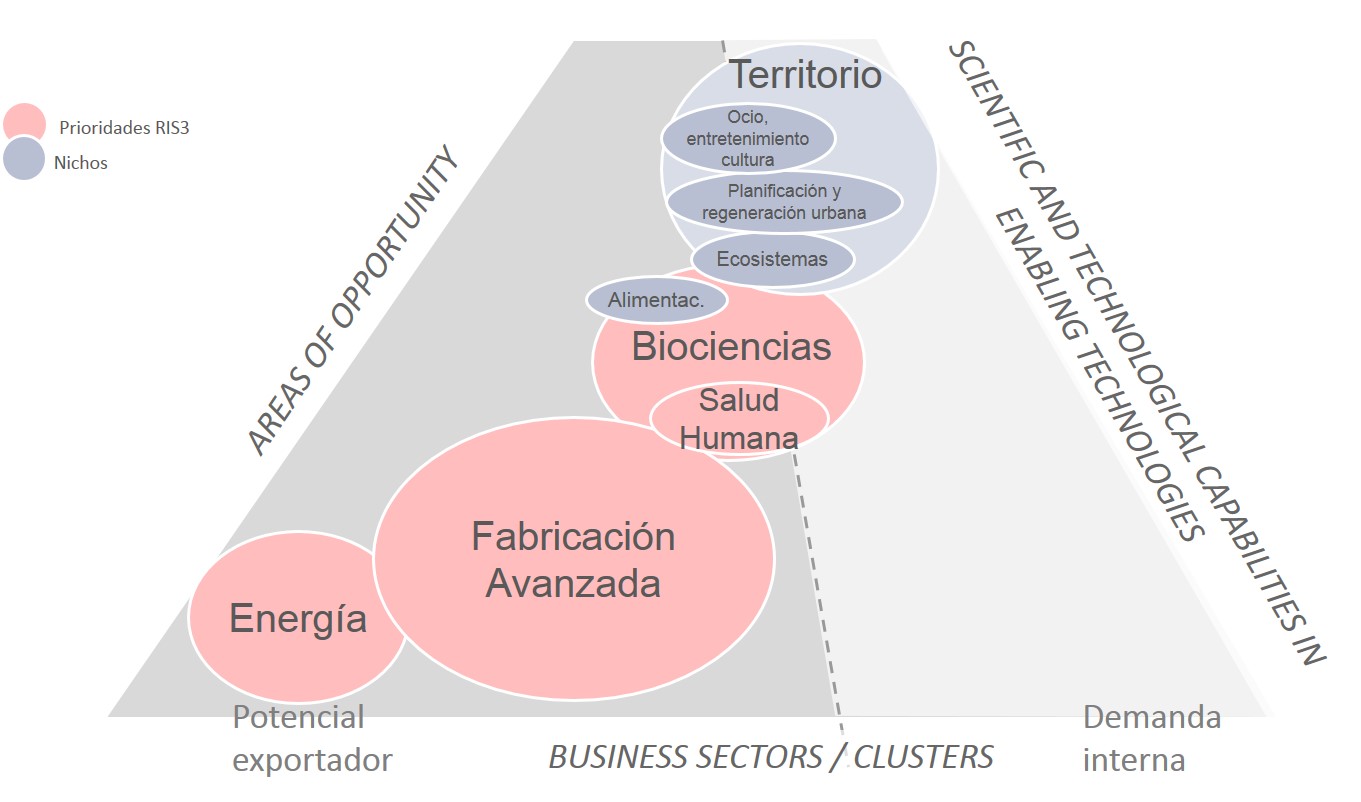The European Commission has launched, to all regions, the challenge of addressing the implementation of strategies for Smart Specialisation, highlighting the importance of concentrating human and financial R&D&I resources in globally competitive areas.
It further requests that this specialisation strategy is the result of a public-private cooperation process, and that the momentum is not pure specialization, but “diversified specialisation”. The ultimate goal is to favour a new economic model, a transformation that enhances and highlights the uniqueness of the business fabric in each region, while respecting the plurality and diversity of their situations.
SPRI supports the Basque Government Department of Economic Development and Competitiveness in developing the Basque Country’s strategy for smart specialisation.
Part of the basis of our work consists of allocating research funds to improving the competitiveness of the Basque Country, always seeking the balance between public and private, with the ultimate goal of improving the lives of people and the competitiveness of enterprises.
The Basque smart specialisation strategy has identified Energy and Advanced Manufacturing as strategic areas.
Euskadi can already demonstrate a track record of developing policies to support competitiveness, specialisation and diversification that comply, to a greater or lesser degree, with RIS3 requirements. To this effect, the Basque Country has spent decades implementing an active policy of support for industry, based on powerful manufacturing clusters.
The diagnostic report drawn up by the EU agrees with the one made recently by the Basque Government, stating that the Basque Country enjoys high values, an important Basque Science and Technology Network which is a European benchmark and an exemplary track record in conviction of commitment to R&D&I.
The regional strategy must be the result of a participatory process in which the various players that make up the ‘Quad Helix’ take part: Government, Business, Academia and Civil Society. And in combination with proper multilevel governance that, from the regional level, establishes a network with different sub-regional, national and supranational levels.
Based on analysis of strengths and weaknesses in our context, work has taken place along three lines: industrial capabilities, scientific and technological capabilities and areas of opportunity, thereby generating inputs that have supplied identification of the vertical priorities required by RIS3.
The three essential enabling technologies of RIS3 Euskadi strategy are: biosciences, nanosciences and advanced manufacturing.
In the process of identifying vertical priorities, the basic document was the Science, Technology and Innovation Plan, PCTI-2020, which establishes a deliberate and explicit strategy of diversifying the Basque economy, based on three essential enabling technologies (biosciences, nanosciences and advanced manufacturing) and five priority markets (transport and mobility, digital world, science industry, ageing and health, and energy).
Consequently, three priorities have been defined in the Basque Country that affect different sectors in which the Basque Country has strong specialisation and skills, with the focus on a key area in the Basque Country, all combined with a commitment to diversify the business fabric towards a high technology level and high growth potential sector. These are Advanced Manufacturing, Energy and bio-health Convergence.

Advanced Manufacturing fulfils these requirements. It affects several production sectors in the Basque Country, is key in the industrial tradition of our country and has significant technological capabilities linked to manufacturing. Progress in technologies such as nanotechnology, advanced manufacturing and ICT will be transferred to the most representative industrial sectors of the Basque economy: metals, machine tools, transportation, environment and advanced services, mainly. The final goal is to increase their competitiveness and added value.
Moreover, the choice of Energy as a priority for the Basque Country lies in the strengths of a business cluster that has the different links of the chain in generation, transmission and distribution and its auxiliary industry. It is a sector with large companies which are international leaders, and in the Basque Country already has technological capabilities in materials, nanotechnology, manufacturing technologies and ICT.
¡Breaking news!
All the latest news
for Basque entreprise
Find all of our contents easily
Presentations, videos, news, interviews
